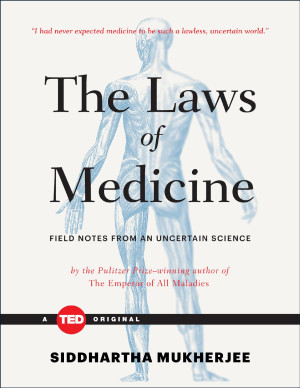Siddhartha Mukherjee - A Physician's Story Of Science
Siddhartha Mukherjee is a remarkable figure, someone who helps us all make sense of some really big ideas in medicine and science, especially when it comes to things like cancer. He’s a doctor who treats people, a scientist who studies how our bodies work, and a writer who shares what he learns with the whole world, making complicated topics feel a lot more approachable. He brings a unique way of looking at health and illness, making it something everyone can connect with, which is quite important.
His work has earned him some pretty significant recognitions, like the Pulitzer Prize for his book about cancer, *The Emperor of All Maladies*, which really changed how many people looked at this illness. He’s also known for helping develop new ways to treat diseases and for his thoughtful pieces that appear in major publications, so you might have seen his name around. He possesses a rare ability to tell a story that is both deeply personal and broadly scientific, drawing readers into the human side of medical discovery.
This piece will explore the path of a person who has dedicated his life to understanding and explaining the intricate details of human health, from the smallest parts of a cell to the broader ways diseases affect us all, and how he manages to share these insights in a way that truly connects with everyone. We will look at his background, his contributions to medical understanding, and how his writing has shaped public conversation about health and science, offering a clearer picture of his significant influence.
- Ultimate Guide To Fapello Your Essential Companion
- The Sinister Case Of Vegas Dahmer A Shocking Tale Of Murder And Mayhem
- Hdhub4u The Ultimate Destination For Nit Entertainment
- Unveiling Hollie Stranos Inspiring Weight Loss Journey
- The Ultimate Guide To Alexis Louders Relationships
Table of Contents
- A Life Dedicated to Discovery - Siddhartha Mukherjee's Path
- Personal Details and Early Life - Siddhartha Mukherjee
- What Drives Siddhartha Mukherjee's Research?
- How Does Siddhartha Mukherjee Explain Complex Science?
- The Impact of Siddhartha Mukherjee's Writings
- What Does Siddhartha Mukherjee See for the Future of Medicine?
- Beyond the Lab - Siddhartha Mukherjee's Wider Influence
- Where Can You Find Siddhartha Mukherjee's Insights?
A Life Dedicated to Discovery - Siddhartha Mukherjee's Path
Siddhartha Mukherjee is, you know, a truly remarkable individual who has made a significant mark in the worlds of medical science and writing. He is a person who looks into cancer, working to find new ways to treat it and to understand its fundamental nature. He’s also someone who earned a very special scholarship, the Rhodes, allowing him to study at Oxford University, which is quite an achievement. What's more, he received a highly respected award for his writing, the Pulitzer Prize, a major honor for books that truly make a difference. And, as a matter of fact, he's been recognized with the Padma Shri, a significant civilian award from his home country, India, showing just how much his contributions are valued.
He has put together several well-received books, including *The Emperor of All Maladies*, which is a kind of life story of cancer. This particular work received the 2011 Pulitzer Prize in General Nonfiction, a testament to its widespread appeal and depth. He also wrote *The Laws of Medicine*, a book that explores the guiding ideas of modern medical practice. In a way, he helps us grasp some really big ideas.
Beyond his own writing, he has also served as the person in charge of putting together *Best Science Writing 2013*, bringing together some of the most compelling scientific narratives of that year. This shows his dedication to promoting good science communication. The book about cancer, published in 2010, received a lot of good feedback from people everywhere. It was later used as the basis for an American film, which helped bring its important message to an even wider audience, expanding its reach quite a bit.
- The Ultimate Guide Everything You Need To Know About All Hub In Hindi
- Is Guy Fieri A Believer Unveiling The Personal Faith Of The Culinary Star
- Exploring The Vibrant Entertainment Hub Vegas3
- The Definitive Guide To Jack Harlows Religion Dispelling The Mystery
- Discover Desimms The Ultimate Gaming Destination
Personal Details and Early Life - Siddhartha Mukherjee
To give you a better idea of who Siddhartha Mukherjee is, here are some key details about his background and professional life, gathered from various sources. This table provides a quick look at his foundational experiences and current roles, offering a clearer picture of his impressive journey.
| Detail | Information |
|---|---|
| Born In | New Delhi, India |
| Education | Bachelor of Science in Biology from Stanford University; Doctor of Philosophy in Immunology from Oxford University (where he was a Rhodes Scholar); Doctor of Medicine from Harvard Medical School. |
| Current Roles | Assistant Professor of Medicine at Columbia University; Staff Cancer Physician at Columbia University Medical Center; CEO for Manas AI. |
| Key Recognitions | Rhodes Scholar; Pulitzer Prize winner (General Nonfiction, 2011); Padma Shri recipient. |
| Notable Works | The Emperor of All Maladies: A Biography of Cancer; The Laws of Medicine; The Song of the Cell; Editor of Best Science Writing 2013. |
| Contributions | Significant involvement in cancer drug development; Redefining public conversation on human health, medicine, and science; Explaining cellular science for breakthroughs in various diseases. |
What Drives Siddhartha Mukherjee's Research?
As a medical doctor specializing in blood conditions and cancer, Siddhartha Mukherjee spends a good deal of his time investigating diseases that affect the blood, like Myelodysplastic Syndromes (MDS) and Acute Myeloid Leukemia (AML). He’s also a physician who sees patients, so he brings a very practical understanding to his scientific pursuits. His curiosity, you know, extends to how the tiny parts of our bodies, our cells, could hold the keys to new ways of treating serious illnesses. He looks at how discoveries in cellular science might open doors to big advances in helping people with conditions such as cancer, HIV, Type 1 diabetes, and even sickle cell anemia, which is quite a wide range of important health challenges.
His latest book, *The Song of the Cell*, really explores these ideas about cells, digging into their fundamental importance. For instance, on page 11 of that book, it mentions that as far as we know, DNA is present inside every living cell, unless it has somehow been removed from that cell. This kind of basic biological fact forms the building blocks of his larger arguments about health and disease. He is, in some respects, always looking for the underlying patterns and principles that govern life and illness, which truly shapes his investigative work.
How Does Siddhartha Mukherjee Explain Complex Science?
One of Siddhartha Mukherjee's special abilities is his knack for making very complicated scientific ideas understandable and even engaging for just about anyone. He doesn't just do research; he also shares his findings and thoughts with a broad audience. He writes for well-known publications like *The New Yorker* and contributes regular opinion pieces to *The New York Times*, which means his ideas reach a lot of people. He has also had his articles appear in medical journals like *The New England Journal of Medicine* and other publications such as *The New Republic*, so he communicates across different kinds of readers, basically.
His book, *The Laws of Medicine*, which was part of the TED Books series, is a prime example of this talent. In this work, he explores the core ideas that guide modern medical practice in a way that is both thoughtful and easy to grasp. He has this way of taking something that might seem daunting, like the principles behind how doctors make decisions, and presenting it in a clear, compelling manner. This helps people who aren't medical professionals get a better feel for how medicine works, and that, is that, truly valuable.
The Impact of Siddhartha Mukherjee's Writings
The impact of Siddhartha Mukherjee's literary contributions is quite significant, especially with his book, *The Emperor of All Maladies*. This book, which provides a detailed account of cancer, was published in 2010. It was met with widespread praise and later became the foundation for an American film, a documentary produced by Ken Burns for PBS, making its story accessible to millions. It’s a book that truly resonated with readers and critics alike, which is important.
The book received the Pulitzer Prize in 2011 for General Nonfiction, a major mark of its excellence and influence. It was also picked by *The New York Times* as one of the best books of the 21st century, showing its lasting importance. The *New Yorker* called it an "extraordinary achievement," and many describe it as a magnificent, deeply human "biography" of cancer, capturing the illness's long and often difficult history. This kind of recognition speaks volumes about its ability to connect with people on a very deep level, you know, making a difficult subject approachable.
Another one of his notable works, *The Gene*, also served as the basis for a Ken Burns documentary on PBS, further cementing his role as a public educator in science. This book became a number one bestseller for *The New York Times*, too, which is quite something. It's considered essential reading, something that both doctors and patients should pick up, offering insights that are relevant to everyone touched by health and illness. His ability to craft narratives around complex scientific topics means his books are not just informative but also deeply moving and thought-provoking, very much so.
What Does Siddhartha Mukherjee See for the Future of Medicine?
Siddhartha Mukherjee's work consistently points towards a future where our understanding of cellular processes could bring about big changes in how we treat some of the most challenging diseases. He sees how looking closely at the tiny components of life could lead to breakthroughs in areas like cancer, HIV, and even genetic blood disorders. His insights, in a way, offer a hopeful outlook for what medicine might achieve next, pushing the boundaries of what we currently understand.
He's not just a person who studies these things; he also plays a very active part in the actual creation of new cancer treatments. He serves as the CEO for Manas AI, which suggests his involvement in applying artificial intelligence to medical challenges, probably to speed up discovery or improve care. This indicates a forward-thinking approach, looking at how new technologies can help us tackle old problems, which is quite exciting. He tends to be someone who looks ahead, always considering the next big steps in medical progress.
Beyond the Lab - Siddhartha Mukherjee's Wider Influence
Siddhartha Mukherjee's influence extends far beyond the confines of a laboratory or a patient's bedside. He holds a position as an assistant professor of medicine at Columbia University, and he is also a staff cancer physician at Columbia University Medical Center, so he's actively involved in teaching and patient care. This dual role allows him to bring both cutting-edge research and real-world clinical experience to his discussions and writings, offering a well-rounded view of health and illness. He truly embodies the physician-scientist model, connecting the bench to the bedside.
He has been recognized as a pioneering physician, an oncologist, and an author who has, in some respects, completely reshaped how we talk about human health, medicine, and science in public spaces. His contributions have moved these topics from purely academic or clinical discussions into something that everyone can engage with and understand. This makes complex ideas accessible, encouraging a broader public interest in scientific discovery and medical progress, which is very much needed.
His ability to communicate complex medical ideas to a general audience is a significant part of his wider impact. For example, when *The Emperor of All Maladies* came out in November 2010, he started the book with a very sobering fact: about six hundred thousand Americans and more than seven million people worldwide would die of cancer that year. By beginning with such a powerful and human statistic, he immediately drew readers into the reality of the disease, setting the stage for his comprehensive and eloquent account. This approach, you know, truly makes his work resonate with people, highlighting the human cost and the urgency of medical research.
Where Can You Find Siddhartha Mukherjee's Insights?
If you're curious to explore Siddhartha Mukherjee's ideas and writings further, there are several places where his insights are available. His books, such as *The Emperor of All Maladies*, *The Laws of Medicine*, and his most recent, *The Song of the Cell*, are excellent starting points. These works offer deep dives into the history of disease, the principles of medical practice, and the fundamental building blocks of life itself. They are, in a way, comprehensive guides to understanding complex biological and medical concepts.
Beyond his books, you can often find his thoughtful articles and columns in major publications. He contributes regularly to *The New Yorker* and has a column in *The New York Times*, so these are good places to look for his ongoing commentary on science and health. His writings have also appeared in respected medical and general interest publications, like *The New England Journal of Medicine* and *The New Republic*, showing his broad reach and influence. He's also been a Plummer Visiting Professor, which means he shares his knowledge in academic settings, too, reaching students and fellow professionals.
His work has also been adapted into documentaries, which provide another way to absorb his insights. For instance, the PBS Ken Burns documentary based on *The Emperor of All Maladies* brought the story of cancer to television audiences, making it visually engaging. Similarly, *The Gene* also became the basis for another Ken Burns documentary on PBS, illustrating his ability to inspire compelling visual narratives from his written words. These adaptations, you know, really help to spread his important messages to an even wider audience, making complex science accessible through storytelling.
- Download Free From Hdspointcom Instant Access To Toprated Files
- Unveiling The Meaning Of A Dead Cardinal In Designated Survivor A Divine Omen Or A Political Crisis
- Discover The Gateway To Vegas Vegasist Unveiled
- Ultimate Guide To Unlocking The Power Of Flix
- The Ultimate Sflix Hub Your Source For Premium Content

Siddhartha Mukherjee on the Promises and Perils of Early Cancer

The Laws of Medicine | Siddhartha Mukherjee | download on Z-Library

The Laws of Medicine | Siddhartha Mukherjee | download on Z-Library